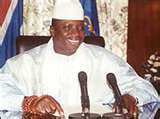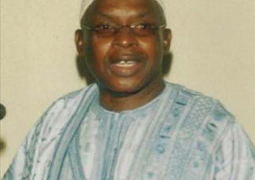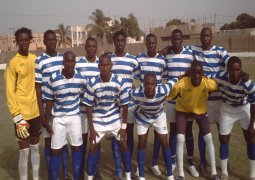
The continuous and seemingly unending scientific evidences that the current global and financial crisis is a serious and urgent issue is now compelling. Signs have shown that it warrants strong action to reduce the risks and impacts of very damaging and potentially irreversible impacts on economies around the world more especially on the African continent.
Reports indicate that the threat of global economic and financial crisis, both current and future, posed to African development is widely documented. Although small in size and population compared to other countries around the globe, The Gambia, according to reports, will face some of the difficulties and effects of the global economic and financial crisis.
President Jammeh in his state opening of parliament address last Friday expressed his worries about the crisis on the state of the Gambian economy.
According to him, it is particularly worrying that the world is going through a deepening economic and financial crisis that has brought about difficulties and adverse effects to both the developed and developing nations such as The Gambia.
He told parliament that in the light of the crisis, the projected growth rate of our Gross Domestic Product in subsequent years is likely to drop from 6.1% achieved in 2008.
Notwithstanding this, he added the Gambian economic fundamentals continue to be intact and are directed at maintaining sustained levels of positive economic growth and price stability.
"Over the next three years, the rate of inflation is expected to average 5.5%. Another indication of economic stability is currency stability. The exchange rate of the Dalasi vis a vis other foreign currencies whilst indicating mixed outcomes in the recent past show the Dalasi appreciating against the CFA Franc, the British Pound and the Swedish Kroner but depreciating against the US Dollar, the Swiss Franc and Euro", he said.
President Jammeh told parliament that government through the Central Bank would not relent in the use of appropriate monetary instruments that would lead to the sustained stability of the Dalasi.
On the tourism sector, which contributes about 16% of the country's economy, the Gambian leader opined that the country continues to maintain its attraction as a highly competitive tourist destination. Despite the challenges facing the sector as a result of the global economic and financial crisis, he went on, the sector has registered impressive development in all forms.
"Efforts would continue to be directed not only at enhancing and consolidating the traditional source market but also penetrate the new markets in Central and
President Jammeh's variegated address did not also spare key sectors like Trade, Industry and Employment.
He further told parliament that his government continues to pursue the vision of making the
On agriculture, a sector that continues to be the backbone of the country's economy, President Jammeh further expressed government's resolve to continue exploring effective collaboration with existing and new partners both bilateral and multi-lateral in the implementation of programs towards developing the sector. He noted that "special attention will continue to be given to the timely provision of the necessary farm and agricultural inputs such as fertilizers as well as the development of the agricultural infrastructure in the areas of water management technologies and related systems".
On Petroleum Development and Mining, the Gambian leader maintained that the country continues to work on track in pursuit of petroleum exploration and development noting it is anticipated that the first drilling would commence in 2010. In the area of mining, he further explained, government is desirous of creating a national mining company.
The setting up of this company, he added, is guided by the desire of his government to nationalize the mineral sector with a view to ensure that Gambians more than anyone derive maximum return from our minerals.
Meanwhile, parliament will resume its sittings today to debate on the speech delivered by President Jammeh.




